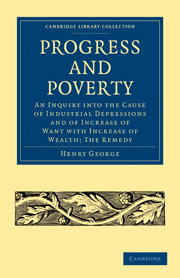 Progress and Poverty
Progress and Poverty Book contents
- Frontmatter
- PREFACE TO FOURTH EDITION
- Contents
- INTRODUCTORY
- BOOK I WAGES AND CAPITAL
- BOOK II POPULATION AND SUBSISTENCE
- Chapter I The Malthusian theory—its genesis and support
- Chapter II Inferences from fact
- Chapter III Inferences from analogy
- Chapter IV Disproof of the Malthusian theory
- BOOK III THE LAWS OF DISTRIBUTION
- BOOK IV EFFECT OF MATERIAL PROGRESS UPON THE DISTRIBUTION OF WEALTH
- BOOK V THE PROBLEM SOLVED
- BOOK VI THE REMEDY
- BOOK VII JUSTICE OF THE REMEDY
- BOOK VIII APPLICATION OF THE REMEDY
- BOOK IX EFFECTS OF THE REMEDY
- BOOK X THE LAW OF HUMAN PROGRESS
- CONCLUSION
- INDEX
Chapter III - Inferences from analogy
Published online by Cambridge University Press: 07 September 2011
- Frontmatter
- PREFACE TO FOURTH EDITION
- Contents
- INTRODUCTORY
- BOOK I WAGES AND CAPITAL
- BOOK II POPULATION AND SUBSISTENCE
- Chapter I The Malthusian theory—its genesis and support
- Chapter II Inferences from fact
- Chapter III Inferences from analogy
- Chapter IV Disproof of the Malthusian theory
- BOOK III THE LAWS OF DISTRIBUTION
- BOOK IV EFFECT OF MATERIAL PROGRESS UPON THE DISTRIBUTION OF WEALTH
- BOOK V THE PROBLEM SOLVED
- BOOK VI THE REMEDY
- BOOK VII JUSTICE OF THE REMEDY
- BOOK VIII APPLICATION OF THE REMEDY
- BOOK IX EFFECTS OF THE REMEDY
- BOOK X THE LAW OF HUMAN PROGRESS
- CONCLUSION
- INDEX
Summary
If we turn from an examination of the facts brought forward in illustration of the Malthusian theory to consider the analogies by which it is supported, we shall find the same inconclusiveness.
The strength of the reproductive force in the animal and vegetable kingdoms—such facts as that a single pair of salmon might, if preserved from their natural enemies for a few years, fill the ocean; that a pair of rabbits would, under the same circumstances, soon overrun a continent; that many plants scatter their seeds by the hundred fold, and some insects deposit thousands of eggs; and that everywhere through these kingdoms each species constantly tends to press, and when not limited by the number of its enemies, evidently does press, against the limits of subsistence—is constantly cited, from Malthus down to the text books of the present day, as showing that population likewise tends to press against subsistence, and, when unrestrained by other means, its natural increase must necessarily result in such low wages and want, or (if that will not suffice, and the increase still goes on), in such actual starvation, as will keep it within the limits of subsistence.
But is this analogy valid? It is from the vegetable and animal kingdoms that man's food is drawn, and hence the greater strength of the reproductive force in the vegetable and animal kingdoms than in man simply proves the power of subsistence to increase faster than population.
- Type
- Chapter
- Information
- Progress and PovertyAn Inquiry into the Cause of Industrial Depressions and of Increase of Want with Increase of Wealth; The Remedy, pp. 115 - 124Publisher: Cambridge University PressPrint publication year: 2009First published in: 1881


